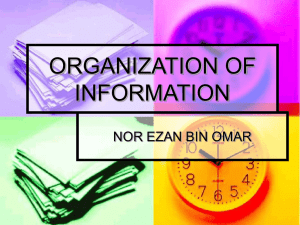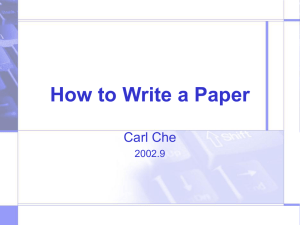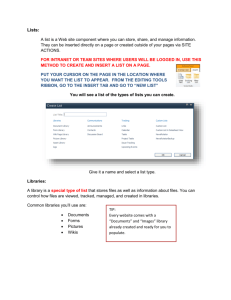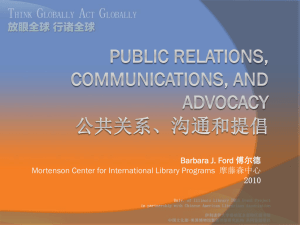Reference - Humanities, Social Sciences, Business
advertisement
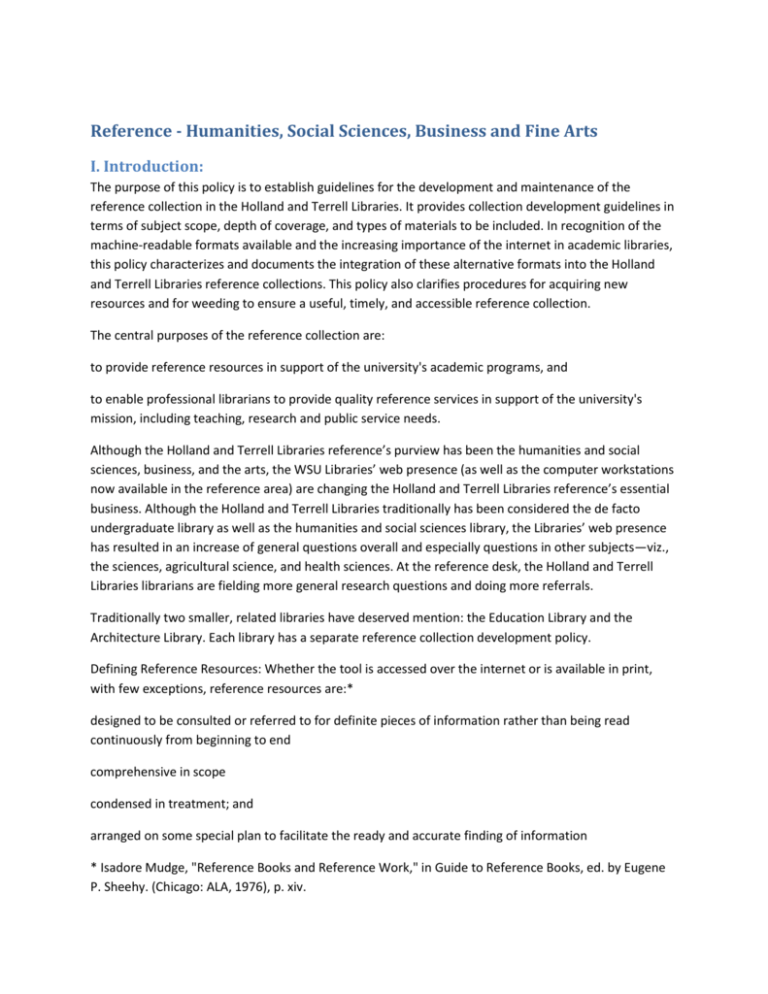
Reference - Humanities, Social Sciences, Business and Fine Arts I. Introduction: The purpose of this policy is to establish guidelines for the development and maintenance of the reference collection in the Holland and Terrell Libraries. It provides collection development guidelines in terms of subject scope, depth of coverage, and types of materials to be included. In recognition of the machine-readable formats available and the increasing importance of the internet in academic libraries, this policy characterizes and documents the integration of these alternative formats into the Holland and Terrell Libraries reference collections. This policy also clarifies procedures for acquiring new resources and for weeding to ensure a useful, timely, and accessible reference collection. The central purposes of the reference collection are: to provide reference resources in support of the university's academic programs, and to enable professional librarians to provide quality reference services in support of the university's mission, including teaching, research and public service needs. Although the Holland and Terrell Libraries reference’s purview has been the humanities and social sciences, business, and the arts, the WSU Libraries’ web presence (as well as the computer workstations now available in the reference area) are changing the Holland and Terrell Libraries reference’s essential business. Although the Holland and Terrell Libraries traditionally has been considered the de facto undergraduate library as well as the humanities and social sciences library, the Libraries’ web presence has resulted in an increase of general questions overall and especially questions in other subjects—viz., the sciences, agricultural science, and health sciences. At the reference desk, the Holland and Terrell Libraries librarians are fielding more general research questions and doing more referrals. Traditionally two smaller, related libraries have deserved mention: the Education Library and the Architecture Library. Each library has a separate reference collection development policy. Defining Reference Resources: Whether the tool is accessed over the internet or is available in print, with few exceptions, reference resources are:* designed to be consulted or referred to for definite pieces of information rather than being read continuously from beginning to end comprehensive in scope condensed in treatment; and arranged on some special plan to facilitate the ready and accurate finding of information * Isadore Mudge, "Reference Books and Reference Work," in Guide to Reference Books, ed. by Eugene P. Sheehy. (Chicago: ALA, 1976), p. xiv. II. Subject Scope and Size of the Collection: The print reference collection of some 35,000 titles reflects the subject scope of the Holland and Terrell Libraries general collections. It provides reference resources in many interdisciplinary fields as well as indepth reference materials in the humanities and social sciences, including architecture, business, and higher education. One notable strength of the collection is in pre-1500 world culture resources in support of the World Civilizations requirement (GenEd 110). Because the publishing industry is in transition as more and more published works are being made available over the internet instead of print (reference works by nature are perfect candidates for internet treatment), the Holland and Terrell Libraries reference collections are also becoming both printbased and machine-readable. The notable machine-readable works first available to the Holland and Terrell Libraries reference librarians, were the Encyclopaedia Britannica and the Oxford English Dictionary. Additionally, government documents such as the Statistical Abstract of the United States have been available online for some time. In Spring 2004, a taskforce of the Library Instruction and Reference Working Group created a Virtual Reference Shelf to collect all the internet tools currently extant throughout the Libraries. (accessed on 12/1/2005). Academic library reference collections traditionally have been composed of national and trade bibliographies; the catalogs of national, university or special libraries; encyclopedias; biographical dictionaries; indexes and abstracts; language dictionaries; subject dictionaries; handbooks, manuals and compendia; guides to the literature; almanacs, annuals and yearbooks; current news sources, statistical sources; various directories, atlases and gazetteers; directories; union lists and directories of newspapers, periodicals, microforms, CD-ROMs, government documents, maps, art reproductions, and manuscripts. Although each of these compilations is still viable in the present day, many of the publications in these categories are available over the internet—especially national and trade bibliographies, many government documents, library catalogs, indexes and abstracts, and union lists of newspapers. Specific collection parameters for the Holland and Terrell Libraries reference collection include some selected bibliographies of individual authors, as well as some specialized subject or area bibliographies. No genealogical materials are collected for the primary purpose of supporting genealogical research, although we do have selected reference works useful in this activity. Coverage of the sciences, veterinary medicine, pharmacy, and K-12 education is excluded. Sweeping changes in format and availability of reference sources dictate a continual weeding of the print reference collection to maintain a current, relevant, and readily accessible "working" collection of resources. III. General Selection Guidelines: Generally, the Holland and Terrell Libraries reference collection consists of the best materials available in a variety of formats (but chiefly print and online) that are reliable, accurate, accessible, and timely. Specific guidelines are as follows: Timeliness:In general, current materials have collection priority over retrospective materials. Whenever possible, current materials will be selected on the basis of favorable reviews or notice in a reputable source. If selection is necessary before publication, the reputation of the publisher or the credentials of the issuing body will be taken into account. The purchase of retrospective works should be based on annotations in standard general or specialized guides in order to acquire the most authoritative works available. Language: For general and subject reference works, priority is given to materials in English. (One obvious exception to this would be unique reference sources in foreign languages and literatures.) Titles in foreign languages are selected if they are superior to or complement the English works available. In addition, except for language dictionaries and national bibliographies, little is acquired in the vernacular languages of Asia, the Middle East, or North Africa or the indigenous languages of Africa, Oceania or the Americas. Works in other non-European languages are not heavily represented. Among the Slavic languages, the major concentration is in Russian. Format: All formats may be purchased if they meet the criteria for subject and scholarly content. When both paper and hardbound print editions are available, the hardbound edition is selected. "Library bound" books are selected when there is a choice. A multi-volume version of a work is to be preferred over a condensed version, when available. Hard copy generally is to be preferred over microform, but microform materials are purchased if paper copies are not available or their price is prohibitive. When at all possible, microform reference materials (microfiche or CD-ROM) are intershelved with the reference books. Electronic resources are considered for purchase, based on general selection guidelines. Duplication: Duplication is avoided in most instances. Elements to be considered in the duplication of reference titles are repeated requests from users, or queuing, potential continuing use, relationship to class and research use, wear and tear, and cost. IV. Guidelines for Types/Formats of Resources: [examples are given in brackets] Please note: Some links below are only accessible in the WSU Library or by WSU Faculty, Staff, and Students. Almanacs, Annuals and Yearbooks: Due to space limitations, only the current volume is kept in the reference collection, with two exceptions being annual review type publications of a bibliographic nature, and encyclopedia yearbooks. [World Almanac, The Year's Work in Modern Language Studies]. Atlases: A representative, current collection of the major, comprehensive world atlases is maintained. Included is a selection of regional and thematic (e.g., historical, economic, linguistic) atlases. [Commercial Atlas and Marketing Guide, Atlas of the American Revolution]. Bibles and Other Holy Books: Due to space limitations, only selected works in major religions are acquired both in the original language and in English. [The Holy Bible (King James version), Koran]. Bibliographies: Traditionally included in this category are universal, national and trade catalogs of libraries and collections. However, the broad use of bibliographic utilities such as WorldCat for verification worldwide has made standard print bibliographies and union catalogs of the Englishspeaking world (e.g., British Museum General Catalogue of Printed Books, and NUC Pre-1956 Imprints) generally obsolete. With so many publisher’s sites on the web, many current trade bibliographies and inprint sources for a variety of countries and/or languages are no longer purchased. (e.g., Catalogue Général des Livres Imprimés, Gesamtverzeichnis des deutschsprachigen Schrifttums) Books in Print can be searched both as an online networked resource and as a hardcopy reference work. Archival guides to the literature, standard lists of manuscripts and microforms collections, subject bibliographies and guides to the literature are shelved in Reference. [Books in Print, American Bibliography]. Country Bibliographies: Due to space limitations, bibliographies on most foreign countries, when purchased, are not kept in the reference collection unless they are likely to receive heavy usage. Dissertation Bibliographies: Digital Dissertations is available electronically. Subject bibliographies of American and Canadian dissertations are not kept in the reference collection unless especially noteworthy. Exceptions are listed under Dissertations/Theses (below). Individual Author/Artist Bibliographies: Selected bibliographies of some individual authors/artists are kept in the reference collection, depending on the prominence of the individual author and whether or not related WSU courses are taught. Subject Bibliographies Published Annually: Due to space limitations, only five years of annual subject bibliographies are generally kept in the reference collection. Other Bibliographies: Due to space limitations, most bibliographies are located in the open bookstacks except for those on current topics in high demand. Biographical Dictionaries: Due to space limitations, only selective bio-bibliographical sources are kept in the reference collection: major universal works [Webster's Biographical Dictionary], major national works [Dictionary of American Biography], current works of the "who's who" variety from all countries, and specialized dictionaries with a regional, chronological or subject orientation are considered on their individual merit and relevance. "Vanity" sources, such as Five Thousand Personalities of the World, are not purchased. [Who's Who in America, Dictionary of American Scholars, Biographical Dictionary of Afro-American and African Musicians] Catalogs, Library: In consideration of the plethora of library catalogs available over the web, few, if any, of these are still being purchased. College and University Catalogs: The Library provides access to the CollegeSource ONLINE, an electronic college information resource. Dictionaries, Language: Concerted effort is made to purchase the most authoritative, scholarly dictionaries available in the major European languages. [Deutsches Worterbuch, Tresor de la Langue Francaise]. This is equally true for bilingual works such as Harrap's Standard German and English Dictionary. College and pocket dictionaries are purchased on a limited basis only. The Oxford English Dictionary is available electronically as well as in a hardcopy set in the Reference collection. English Language: A broad collection of general, etymological, and specialized dictionaries are purchased, including major dialects, regional variations, special periods, slang, synonyms, etc. Multiple copies of Webster's Third New International Dictionary of the English Language are located in the reference collection and in Quick Info centers on other floors. Other European Languages: The great language dictionaries are purchased, e.g., Grimm's Deutsches Worterbuch, as are the authoritative bilingual (English-. . .) dictionaries, Harrap's New Standard French and English Dictionary. Copies of bilingual dictionaries in French, German, and Spanish are located at Quick Info centers on other floors. Other Languages: A minimum number of dictionaries (only one or two) for each non-European language are located in reference except for languages in which WSU courses are taught. These include a mix of monolingual, bilingual, and etymological works. Digests of Books: Digests are purchased selectively, and are usually kept in the open bookstacks. One notable exception, Survey of Contemporary Literature ("Masterplots"), is in the reference collection. Directories, Business and Commercial: As a major source of company data, comprehensive directories are a standard purchase for reference. Emphasis is on U.S. directories, with selected international works. [MergentOnline database, Lexis-Nexis, Directory of Corporate Affiliations, Million Dollar Directory, Exporter's Encyclopedia, Europe's 15,000 Largest Companies)] Directories, City: Purchases are presently limited to one standing order for the Spokane city directory. [Polk City Directory: Spokane, Washington] Dissertations/Theses: Digital Dissertations is available electronically. Subject bibliographies of American or Canadian dissertations are generally not kept in the reference collection. Notable exceptions are lists of WSU and University of Idaho dissertations. Documents: Government document reference sources focus primarily on U.S., Washington State, and United Nations publications, along with selected documents such as parts of the U.S. Census, U.S. Code, and Statutes at Large, etc., which are not reference books per se. The Libraries are a selective depository for federal documents and a member of the state depository system. The Holland and Terrell Libraries contains an extensive collection of United Nations and international agency documents. The Holland and Terrell Libraries also has a selective collection of documents from a variety of world governments (especially Great Britain) with selective holdings of many quasi-governmental and private entities. Only latest editions of resources are located in the reference area. [Demographic and economic censuses, a variety of Department of Labor sources.] The plethora of documents electronically available is reflected in GRIFFIN, the Libraries’ catalog, including many reference works. These reference works are also available through the government’s websites, including . STAT-USA [Statistical Abstract of the United States] Encyclopedias, General: WSU Libraries presently has one networked encyclopedia, Encyclopaedia Britannica. Although several standard English language encyclopedias are kept in the reference collection, they are purchased on an irregular schedule. The Yearbook to the hardcopy Encyclopaedia Britannica is purchased, as well as the reference department purchases new editions of, and supplements to, the most important French, Spanish, German, Italian, Japanese, and Russian language general encyclopedias (and/or sometimes their English translations). [Encyclopedia Americana, Kodansha Encyclopedia of Japan] Gazetteers and Place Name Sources: The reference department collects current and comprehensive gazetteers and selected place name books of the United States and Canada. A selection of international works is also on reference. [Columbia Lippincott Gazetteer of the World, American Place Names] Handbooks, Dictionaries, Companions & Specialized Encyclopedias: The reference collection includes a selective number of handbooks, dictionaries, companions and specialized encyclopedias. [Lesly's Public Relations Handbook, The Oxford Companion to American Literature] Indexing and Abstracting Services: General, interdisciplinary, and subject specific indexes and abstracts have been covered comprehensively to meet all levels of instructional and research need. However, because networked resources seem to receive a good deal more use each of our hardcopy indexes and abstracts is in the process of being evaluated according to its subject usefulness, the overwhelming need, and its frequency of use. Indexing and Abstracting Services: General, interdisciplinary, and subject specific indexes and abstracts have been covered comprehensively to meet all levels of instructional and research need. However, because networked resources seem to receive a good deal more use each of our hardcopy indexes and abstracts is in the process of being evaluated according to its subject usefulness, the overwhelming need, and its frequency of use. Most indexes to individual periodicals are shelved with the periodicals in the stacks, except in cases when the backfile is only on microform. Indexes to individual newspapers are housed in reference. [Child Development Abstracts, Play Index, Granger's Index to Poetry] Law Reporters: Many law reporters were cancelled when they overlapped with Lexis-Nexis Academic Universe. Presently 10 years of most law reporters will be kept in reference. Exceptions: The current year of Supreme Court Reporter and all volumes of Media Law Reporter are kept in the reference collection. Maps: City, state and international maps (largely highway or street maps) are collected by and housed in the reference area. U.S. Army and British Army maps are accessed through indexes located in the reference area. The maps thus identified are retrieved from a storage area. Periodical and Newspaper Directories and Union Lists: Bibliographies of periodicals and newspapers, whether directories, national bibliographies, or union lists are no longer being actively collected, as we use WorldCat, but many are still housed in the Holland and Terrell Libraries reference. [New Serials Titles, Catholic Serials of the Nineteenth Century in the United States] Quotation and Proverb Books: Selective current editions of major English language dictionaries of quotations and proverbs and representative basic titles in other commonly known languages are part of the reference collection. [Oxford Dictionary of Quotations, The Dictionary of Canadian Quotations and Phrases] Looseleaf Services (Transmittals): The reference department still purchases looseleaf services primarily in the areas of business and legislation. Selected services in non-business subjects are also collected. [Value Line Investment Survey, AICPA Professional Standards] Statistical Yearbooks: The latest editions of statistical yearbooks from national associations, international agencies and foreign countries are kept on reference. [Statistisches Jahrbuch fur die Bundesrepublik Deutschland, United Nations Statistical Yearbook]. In addition, many statistical data sources are selectively purchased and the most current editions are located in reference. [Sales and Marketing Management, Standard Rate and Data Service,] At present, the Simmons Study of Media and Markets has evolved into Choices 3, one of the few remaining stand-alone CD-ROM databases in the Holland and Terrell Libraries Reference. Style Manuals: Current editions of style manuals suited to the needs of humanities and social sciences users are maintained, e.g., Manual for Writers of Term Papers . . . (Turabian). Style manuals which are designed to serve the purposes of a single journal, learned society, or publisher are selectively purchased. [MLA handbook for writers of research papers, Chicago Manual of Style, Publication Manual of the American Psychological Association] Telephone Directories: Many telephone numbers are available on the Web. Directories for cities and towns of the State of Washington are purchased in hard copy. Additional directories of Northwestern cities and towns may be purchased, as well as directories from world capitals and major Canadian cities. Vertical Files: A few vertical files house uncataloged, special format, and ephemeral reference materials although, as a result of the amazing information housed on the web, these are being phased out. The files include art prints (filed mainly by individual artists); plays; portraits, including The International Portrait Gallery; and a reference desk file of miscellaneous materials. V. Management of the Reference Collection The Manager, the Holland and Terrell Libraries Reference Services and Microforms has immediate responsibility for the selection and maintenance of the reference collection. This responsibility is shared among humanities/social sciences subject specialists (all of whom are also reference librarians) with respect to their various disciplines. Each subject specialist may recommend additions to the collection in his/her subject field and should also periodically weed in assigned subject areas. Input on other reference collection development decisions will be sought from the reference staff when appropriate. Requests for major reference purchases, expensive sets, significant standing order commitments and the like, are subject to the review of all Hum/Soc subject specialists. This review may sometimes extend to others outside the reference staff. Guidelines for Selection of Reference Resources: Relation of new item to materials already in collection or readily available over the internet. Duplication with either should be avoided whenever possible. Format availability; networked WSU-wide, WSU-Pullman, etc, hardcopy, a microformat, CD-ROM, etc. Authority and reputation of author and publisher. Currency/timeliness. Anticipated heavy usage. Consider courses taught and degrees awarded at WSU. Contents: quality, arrangement, extent of coverage, ease of access. Existence of favorable reviews in reputable sources. Guidelines for Weeding from Reference Collection: Frequency of use. If item is not used with any degree of regularity or has been superceded by another source or internet resource, consider withdrawing item from the reference collection. Quantity of reference resources required by the subject area and/or academic program. Importance of resource for reference use. Check for inclusion in general or subject guides to reference works or consult with faculty in subject areas. Age of source and availability of later editions. Often superseded editions and duplicate copies of lesserused works are retained as circulating copies. Backfiles of lesser-used serial publications may be sent to the stacks at specified intervals. These titles circulate for two hours only. Disposition Options After Weeding: [also consult appropriate head of collection development] Send to open stacks. Withdraw an outdated title whose worth is nil (or marginal, at best). Send to compact storage. Infrequently recommended and approved on case-by-case basis. Bind and/or repair. Christy Zlatos Spring 2004
